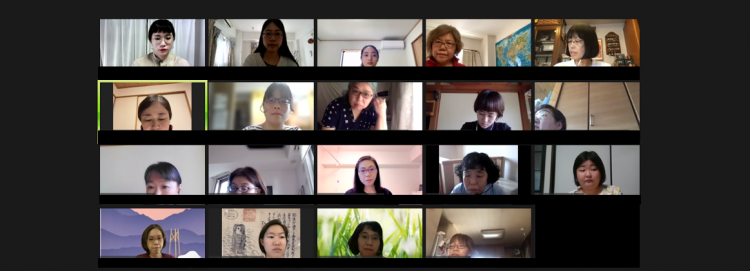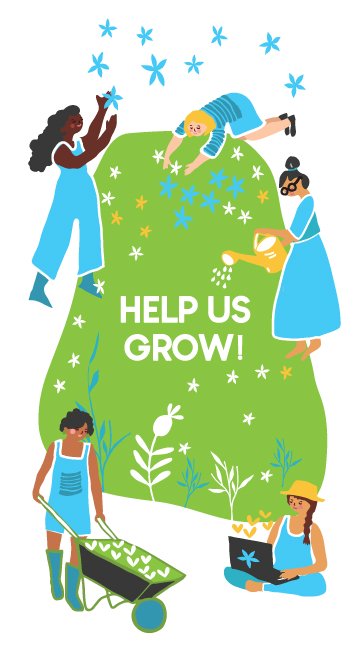“I was looking for a chance to complete #MyBodyMyMind 1 with YWCA leaders.”
Listening to these comments, I initiated three virtual study groups to read the #MyBodyMyMind toolkit. About 20 YWCA leaders from around Japan read it. The aim was to gain basic knowledge about mental health and SRHR, as well as recent data, policies, and changes in Japan, so that we could see how closely these two issues are related to daily life. Last year, I organised study groups to read the Rise Up! guidebook, but only for those who were members of my local YWCA. This year, I decided to invite all YWCA leaders in Japan to join the group as a presenter or a participant, with hope that we can all collaborate smoothly to take action on a bigger scale to tackle these problems across Japan.
Intergenerational dialogues in a safe space
“This study group was exactly what I yearned for.”
“I realised that the space where I could share my thoughts and experiences safely was essential, since I had not had this space for half a year.”
These were the comments from the study group participants and underlined the fact that the spaces were really safe. We were able to exchange opinions on SRHR and mental health which were considered taboo in Japan. We shared our thoughts and personal experiences, whether they were bitter or sweet.
The participants came from various age ranges from teens to over 60s. I am 26 years old and was surprised about how little progress has been made, when senior members talked about what they had seen when they were young. People across various generations had different viewpoints, so the conversations were very insightful as everyone found both similarities and differences. Indeed, under certain topics, we found generational gaps such as attitudes towards online advocacy, but it was clear that we have been moving forward together to achieve the goal of creating a world where every person can enjoy their full human rights.
Key learnings and discussions
As a result of the many intergenerational conversations in a safe space, with a respectful atmosphere and reliable information, the top three takeaways are:
- SRHR are essential, not only because they are human rights, but because they also improve the quality of life.
SRHR are often mentioned in the context of protecting people from coercion, discrimination, and violence. Since we live in Japan where sexual experiences are considered taboo, we were surprised that positive words were associated with the rights such as sexual pleasure, the right to have pleasurable, satisfying, and safe sexual experiences.
- What and how to be taught is the basis for transformative change.
In Japan, mental health and illness, and human rights are the topics that we do not not talk about or teach in schools. Through the discussions, we recognised that the lack of opportunity to learn about mental health and human rights has resulted in negative consequences. For example, when I was a junior high school student, I was very reluctant to meet a counselor for fear of being spoken ill of by my classmates due to the stigma around mental health. The lack of understanding of human rights causes inequality, little progress for equity, and discriminatory comments by officials. We recognised the importance of comprehensive sexual education.
How to be taught was also discussed. As an advocate, we try to raise awareness about social issues, but sometimes our conversations with friends finish very quickly with the phrase “they (those with the problems) are poor”. Since some of the members of the study group have organised workshops for school students, it is necessary for us to deliberately plan the content, so that the students can meaningfully engage in social issues.
- YWCA is a pool of leadership models.
In module nine, we learned about the concept of leadership and role models. Leadership means empowering, collaborating with, inspiring, or mentoring a group of individuals or organisations to create positive change. It is not a single person who has the leadership, but within the YWCA movement, leadership is shared. Therefore, the sum of unique leadership traits of various people can result in transformative change. Indeed, Malala Yousafzai, Greta Thunberg, and Emma Gonzales who are highlighted in the toolkit are all great leaders, but many of us think we cannot be a leader like them. I believe that the shared, inclusive and transformative leadership model of YWCA can empower people to be a leader by serving as a bridge between famous leaders and themselves. We discussed the Japanese role models and one of the participants said that she has lots of role models just around her because YWCA members have been showcasing leadership in various ways. I felt the power of our organisation very strongly.
The study groups have ended, but our activities are starting to reach the next level. We use what we learned in our activities in each local YWCA. My team has adopted the definitions of leadership for a leadership workshop with junior and senior high school students. Another person is trying to start a session to deepen understanding of SRHR. Intergenerational YWCA leaders around Japan studied and discussed together, and now we are starting to advocate together!
You can download here #MyBodyMyMind toolkit
*1- #My Body My Mind is a toolkit on advocacy for mental health and sexual reproductive health and rights (SRHR), published by the World YWCA.






